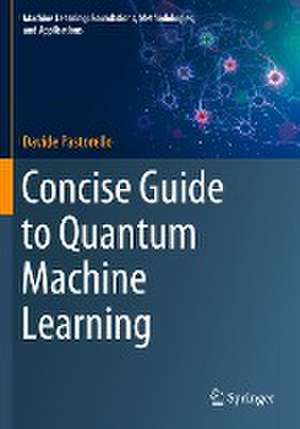Concise Guide to Quantum Machine Learning: Machine Learning: Foundations, Methodologies, and Applications
Autor Davide Pastorelloen Limba Engleză Paperback – 17 dec 2023
To gain the most from this book, a basic grasp of statistics and linear algebra is sufficient; no previous experience with quantum computing or machine learning is needed. The book is aimed at researchers and students with no background in quantum physics and is also suitable for physicists looking to enter the field of QML.
| Toate formatele și edițiile | Preț | Express |
|---|---|---|
| Paperback (1) | 981.71 lei 6-8 săpt. | |
| Springer Nature Singapore – 17 dec 2023 | 981.71 lei 6-8 săpt. | |
| Hardback (1) | 989.31 lei 6-8 săpt. | |
| Springer Nature Singapore – 17 dec 2022 | 989.31 lei 6-8 săpt. |
Preț: 981.71 lei
Preț vechi: 1227.14 lei
-20% Nou
Puncte Express: 1473
Preț estimativ în valută:
187.85€ • 195.75$ • 155.54£
187.85€ • 195.75$ • 155.54£
Carte tipărită la comandă
Livrare economică 03-17 aprilie
Preluare comenzi: 021 569.72.76
Specificații
ISBN-13: 9789811968990
ISBN-10: 9811968993
Pagini: 138
Ilustrații: X, 138 p. 12 illus., 5 illus. in color.
Dimensiuni: 178 x 254 mm
Greutate: 0.27 kg
Ediția:1st ed. 2023
Editura: Springer Nature Singapore
Colecția Springer
Seria Machine Learning: Foundations, Methodologies, and Applications
Locul publicării:Singapore, Singapore
ISBN-10: 9811968993
Pagini: 138
Ilustrații: X, 138 p. 12 illus., 5 illus. in color.
Dimensiuni: 178 x 254 mm
Greutate: 0.27 kg
Ediția:1st ed. 2023
Editura: Springer Nature Singapore
Colecția Springer
Seria Machine Learning: Foundations, Methodologies, and Applications
Locul publicării:Singapore, Singapore
Cuprins
Chapter 1: Introduction.- Chapter 2: Basics of Quantum Mechanics.- Chapter 3: Basics of Quantum Computing.- Chapter 4: Relevant Quantum Algorithms.- Chapter 5: QML Toolkit.- Chapter 6: Quantum Clustering.- Chapter 7: Quantum Classification.- Chapter 8: Quantum Pattern Recognition.- Chapter 9: Quantum Neural Networks.- Chapter 10: Concluding Remarks.
Recenzii
“The book under review summarises lecture notes presented by the author for the quantum machine learning MSc course at the University of Trento; it is therefore structured in a student-friendly manner, offering support both on the mathematical side (also with the interpretation of quantum mechanics) and on the algorithmic side. ... The book concludes with an extensive, well-curated set of references, which represent an excellent continuation of quantum approaches.” (Irina Ioana Mohorianu, zbMATH 1530.68003, 2024)
Notă biografică
Davide Pastorello is an assistant professor in the Department of Information Engineering and Computer Science at the University of Trento.
Textul de pe ultima copertă
This book offers a brief but effective introduction to quantum machine learning (QML). QML is not merely a translation of classical machine learning techniques into the language of quantum computing, but rather a new approach to data representation and processing. Accordingly, the content is not divided into a “classical part” that describes standard machine learning schemes and a “quantum part” that addresses their quantum counterparts. Instead, to immerse the reader in the quantum realm from the outset, the book starts from fundamental notions of quantum mechanics and quantum computing. Avoiding unnecessary details, it presents the concepts and mathematical tools that are essential for the required quantum formalism. In turn, it reviews those quantum algorithms most relevant to machine learning. Later chapters highlight the latest advances in this field and discuss the most promising directions for future research.
To gain the most from this book, a basic grasp of statistics and linear algebra is sufficient; no previous experience with quantum computing or machine learning is needed. The book is aimed at researchers and students with no background in quantum physics and is also suitable for physicists looking to enter the field of QML.
Caracteristici
Offers a brief but effective introduction to quantum machine learning Reviews those quantum algorithms most relevant to machine learning Does not require a background in quantum computing or machine learning











